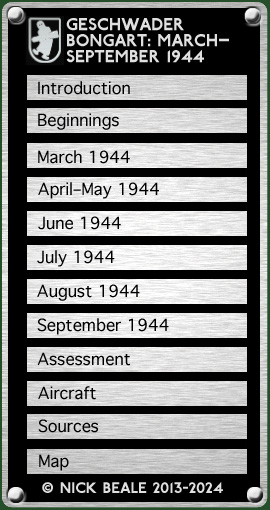|
13–14 June
The Geschwader was able to report that the besieged Flak men at Marèges had been relieved by parachutists while Lfl. 3 added that aerial surveillance was continuing. A relief column from Ussel (24 km by road) extricated the dam’s garrison and withdrew from the area next day. Two intercepted signals from the 12. Staffel revealed something more about how Bongart’s aircraft were scattered across different airfields. The 10. Staffel, addressed in Aix-L’Enfant, was asked when the Bf 109 E would be made ready and taken to Châteauroux (it was not clear whether this referred to one aircraft or several) while a workshop in Brussels was requested to send a completion date for work on one or more Bf 110 and to supply details of its/their variant, Werk Nummer and markings.
From 04.10–06.07 hrs. at least one Ju 290 of 2./FAG 5, piloted by Ludwig Herrlein, flew a “special operation against terrorists” from Mont de Marsan. This was probably connected with a message from Aerodrome Regional Command 5/XII (in Bordeaux) that “until the terrorist area of Mont de Marsan has been mopped up”, a group of female signals personnel would remain in Mérignac. The use of a Ju 290 suggests that this was an emergency: a four-engined aircraft with correspondingly high fuel consumption, it could certainly carry out observation but its long range was not needed here. If necessary, it could bring its defensive guns (MG 151/20 and MG 131) to bear on ground targets but it carried no bombs. Late in the day, III./KG 100 dispatched two Do 217 to attack guerillas in the area NW of Agen (roughly midway between Bordeaux and Toulouse). They took off at 15.30 and 16.08 hrs. respectively, landing at 17.12 to 17.30 to report that their task had been carried out successfully. Almost certainly it was these Dorniers which attacked Houeillès (roughly 120 km north west of Blagnac) where the FTP unit “Bataillon Arthur” had been troubling German and Vichy forces; one female civilian was killed by the bombs. On the northern fringe of the Vercors Plateau, Saint-Nizier-du-Moucherotte lay in the path of a German probing attack along the easiest access route up to the high ground. It was defended by 250 Résistants and the three days of fighting would leave 55 of the village’s 70 buildings in ruins. This was the opening of the German operations against the Maquis of the plateau, an offensive to which Geschwader Bongart would soon be committed. On the 14th, around 20 houses and the police station were wrecked and a woman was killed when the Luftwaffe returned to Houeillès. Four bombers dropped a reported 60 x 50 kg bombs and machine gunned inhabitants who had sought shelter behind a water tower. A Maquisard Bren gunner is said to have hit one aircraft which crashed in flames near le Placiot.
The IV./Fl.ZG 2 complained of receiving a mere tenth of its June allocation of wood-gas vehicle fuel, stressing that supply of the outstanding 6300 kg was “urgently necessary.” Another message, sender and recipient unknown, advised that Luftflotte 3 had ordered that six “bomb personnel” (armourers?) were to assist Geschwader Bongart. 15 June Jagdgruppe 200 meanwhile was operating throughout the day against “gangs in the Valence area.” The 2. Staffel’s Ltn. Heinz Moschke took off from his home base of Orange-Caritat at 05.18 GMT on his first mission of the day, landing in Valence half an hour later. He flew another six operations from there, returning finally to Caritat at 18.20 hrs. Moschke flew three different Bf 109s, reporting that he had shot up cars, lorries and buildings. Moschke’s flights were almost certainly associated with the reprisals inflicted on Saint-Donat-sur-l’Herbasse for local resistance activity. Between 08.30 and 09.00 (local time) four Bf 109s shot up streets, houses and gardens in five passes. Soon afterward Ostbataillon (ex-Red Army) troops encircled the village and subjected its inhablitants to arson, shootings, rape, beatings and arrests. According to historian Dr. Peter Lieb, German aircraft “in an extraordinarily tasteless act of propaganda” then dropped leaflets warning the inhabitants against friendship with Russia. German police authorities in France reported that a unit of Fliegerdvision 2 considered “the situation in the whole area to be critical because of the danger from bandits who had broken the railway and telephone connections so that units found difficulty in moving or getting rations”. Divisional HQ was urged to take immediate action. continued on next page …
|
||||


